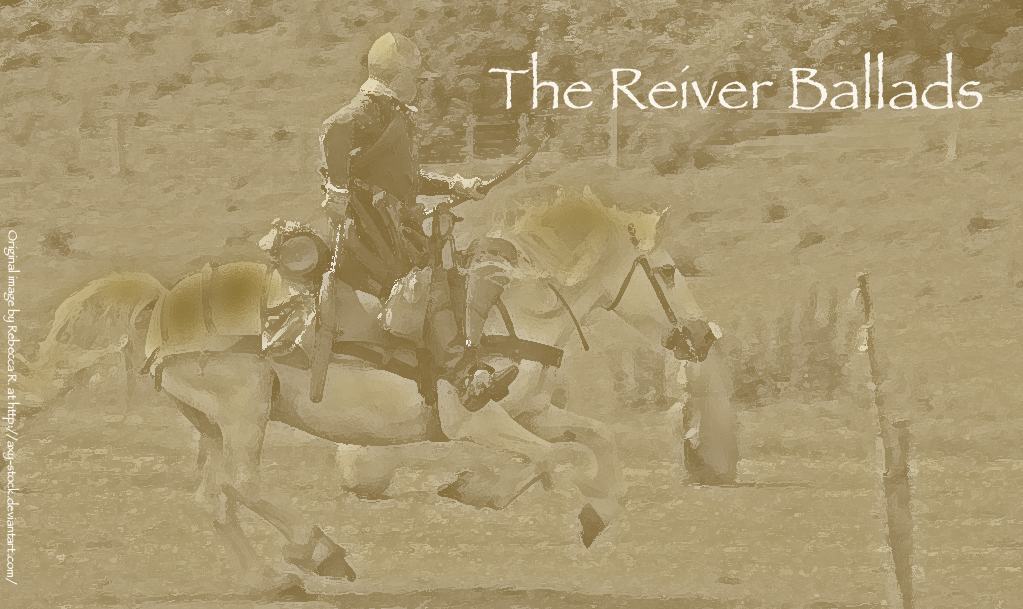Jamie Telfer of the Fair Dodhead
“Jamie Telfer of the Fair Dodhead” appeared in the Minstrelsy from the 1st edition in 1802, and appears in all the editions covered by this project. It is the 7th ballad in the 1802 edition.
This is one of the raid and retrieval ballads contained in the Minstrelsy. The ballad was collected by Sir Walter Scott and most probably the versions he collected were edited into the whole which he presented in 1802. Scott noted that there was a variant, where the Elliots, rather than the Scotts, were the heroes. It should be noted that some of the riders called upon to ride are notable Elliots.
History
There is no historic precedent for this ballad, and it has provided various points of contention over the year. However, many of the characters mentioned (with the notable exception of Jamie Telfer himself) have historic parallels. The ballad may be viewed as an example of typical reiving and counter-reiving. The leader of the initial raid – the Captain of Bewcastle – is a Border official from the English Middle March: it is the Captain of Bewcastle who rescues the stolen stock in “The Fray of Suport”, and it is interesting to consider “Jamie Telfer” and “The Fray of Suport” together.
The Characters
Jamie Telfer
There is no specific individual of this name who appears in historical documents. Jamie Telfer, therefore, should be taken as a representative of one of the inhabitants of the Border, who found themselves victim to the Border reivers.
The Captain of Bewcastle
The Captain of Bewcastle is likely to be a Musgrave: Sir Simon Musgrave was the Captain of Bewcastle for many years, having succeeded another Musgrave. He is indicted in several writs in the Calendar of Border Papers, as well as complaining against Scottish riders. Simon Musgrave also deputised his sons to be his deputy – first Christopher, then Richard and then Thomas, who had quite a reputation of his own.
Gibby Elliot
There are a number of Gib (Gilbert) Elliots mentioned in the Calendar of Border Papers. Martin Elliot was one of the leaders of the Elliot clan – he is better known as Martin of the Preakin (or Pricken / Preakenhaugh) Tower, and, according to Scott, he was the hero of an alternative version of the ballad, where the Elliots ride to retrieve Jamie Telfer's goods. One of Martin Elliot's sons was Gib: he was killed on a raid into Liddesdale by Tynedale riders in 1597. The English Warden Eure noted his death in a letter, and judged it to be a good thing.
In 1597, the Scottish March Warden Carmichael had handed over Gib Elliot, brother to Robert (sometimes identified as Robin) Elliot of Reidheuch, the most dominant Elliot family, to Henry Leigh. King James VI wrote to request his return to Scotland.
Robe's Gib Elliot was one of the men who met with Buccleuch regarding the rescue of Kinmont Willie. The Stobs connection with the Elliot clan can be dated from around 1584.
Jock Grieve
Wat of Harden (Born before 1563- 1629)
Gaudliands
Scott of Gaudilands was described by Scott of Satchell's as Buccleuch's “uncle's son”.
Allanhaugh
Scott of Allanhaugh was another adherent of Buccleuch.
Gilmanscleuch
Robert Scott of Gilmanscleuch was another adherent of Buccleuch's and rode for Kinmont's rescue.
Commonside
The Scotts of Commonside were adherents of Buccleuch, and were riders for Buccleuch at the rescue of Kinmont.
The Currors
Walter Scott of Satchells, in discussing the rescue of William Armstrong of Kinmont, mentions “George Curror in Hartwood-myres” and associates him with Buccleuch.
Willie of Gorrinberry
In 1596, after the rescue of William Armstrong of Kinmont, Scrope wrote to Lord Burghley and in the enclosed list of principal riders, “Will Ellot goodman of Gorrombye” is named. The inclusion of an Elliot may be a recollection of the other version of this ballad, which Scott mentions, where the Elliots ride to Jamie Telfer's aid.
